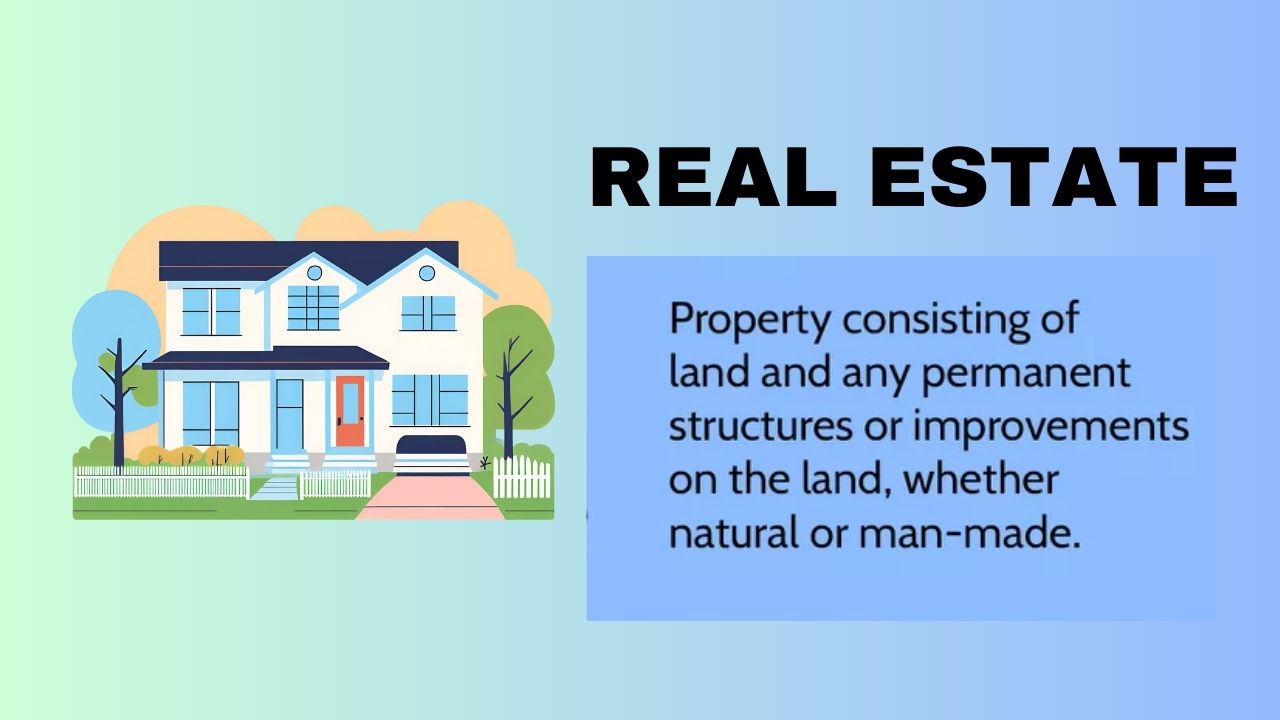Real estate is one of the most lucrative investment opportunities available today. Whether you’re looking to purchase your first home, diversify your portfolio, or delve into property development, understanding the ins and outs of real estate is essential. In this blog, we’ll explore the fundamentals of real estate, the different types of properties, investment strategies, and what makes the real estate market tick.
What Is Real Estate?
At its core, real estate refers to the land and any permanent structures attached to it, whether they are natural or man-made. This can include houses, commercial buildings, factories, or even something as basic as a plot of undeveloped land. Unlike personal property (such as cars or jewelry), real estate is immovable, making it a unique form of investment that requires careful planning and knowledge.
Types of Real Estate
The world of real estate is broad, and it can be categorized into five main types:
- Residential Real Estate: These are properties designed for living purposes. Think of single-family homes, condominiums, duplexes, and townhouses. Residential properties are typically bought for personal use, though they can also be rented out or flipped for profit.
- Commercial Real Estate: This category is where business happens. Office spaces, retail stores, shopping malls, restaurants, and hotels all fall under commercial real estate. These properties are generally acquired to generate income, making them a popular choice for investors.
- Industrial Real Estate: Factories, warehouses, and distribution centers fall under this category. Industrial properties are used for production, storage, and distribution of goods. This sector tends to attract businesses looking for large, functional spaces rather than luxurious designs.
- Land: This includes undeveloped land, agricultural plots, and vacant lots. Investors often purchase land with the intent to develop it or hold it as a long-term investment, hoping its value will increase over time.
- Special Purpose Real Estate: These properties serve a specific need and are often owned by the government or nonprofit organizations. Examples include schools, libraries, parks, and churches.
How Real Estate Affects the Economy
Real estate is more than just buying and selling properties—it’s a key driver of economic growth. In many countries, the real estate market is closely tied to overall economic health. For example, housing starts (the number of new residential construction projects) are a critical economic indicator. A rise in housing starts typically signals economic expansion, while a decline could point to a recession.
In addition to construction, real estate transactions create jobs in sectors such as financing, insurance, and property management, further boosting the economy.
Real Estate as an Investment
Investing in real estate can be incredibly rewarding, but it’s not without its risks. There are two primary ways to invest in real estate:
- Direct Investment: This involves buying a property, such as a rental home, a commercial building, or even a piece of land. The goal here is to earn income through rent or property value appreciation over time.
- Indirect Investment: Not ready to buy a property? You can still invest in real estate indirectly through Real Estate Investment Trusts (REITs). REITs allow investors to purchase shares in a company that owns, operates, or finances income-producing real estate. This option provides liquidity and lower capital requirements compared to direct investment.
Pros and Cons of Real Estate Investment
Pros:
- Steady Income: Rental properties can generate a regular cash flow.
- Capital Appreciation: Property values generally increase over time.
- Portfolio Diversification: Real estate can balance your investment portfolio, acting as a hedge against stock market volatility.
- Leverage: Many investors use financing to buy property, potentially amplifying returns.
Cons:
- Illiquidity: Selling a property can take time, making real estate less liquid than stocks or bonds.
- High Initial Costs: The upfront costs of buying property, including down payments, closing costs, and renovations, can be significant.
- Active Management: Unlike stocks, real estate often requires ongoing management, especially with rental properties.
- Local Market Risk: The value of a property can be heavily influenced by local factors such as employment rates, crime rates, and public infrastructure.
Tips for New Real Estate Investors
If you’re just starting in real estate, consider the following:
- Research the Market: Understand the area you want to invest in. Look at property values, local economic conditions, and future development plans.
- Start Small: For your first investment, consider a smaller property, such as a single-family home or a duplex, before moving on to larger commercial or multi-family properties.
- Consult Professionals: A real estate agent, property manager, and financial advisor can guide you through the process, helping you make informed decisions.
- Think Long-Term: Real estate is typically a long-term investment. Be patient and focus on building steady income and appreciating value over time.
Final Thoughts
Real estate can be a powerful tool for wealth building, whether you’re interested in buying your first home or expanding into investment properties. It offers the potential for steady income, capital appreciation, and portfolio diversification. However, it’s essential to do your homework, understand the risks, and take a long-term view to make the most of your real estate ventures.
Happy investing!
1. What is real estate?
Real estate refers to land and any permanent structures attached to it, such as houses, commercial buildings, or industrial facilities. It includes both natural resources on the land (like minerals) and man-made improvements (such as buildings and infrastructure).
2. What are the different types of real estate?
Real estate is typically divided into five main categories:
- Residential: Homes, apartments, and condos used for living purposes.
- Commercial: Properties used for business, such as offices, malls, and hotels.
- Industrial: Factories, warehouses, and distribution centers.
- Land: Undeveloped or agricultural property.
- Special Purpose: Public-use buildings like schools, libraries, and churches.
3. How do I invest in real estate?
There are two main ways to invest in real estate:
- Direct Investment: Purchase a property (like a rental home or commercial building) to generate income through rent or appreciation in property value.
- Indirect Investment: Invest in a Real Estate Investment Trust (REIT) or real estate mutual funds, allowing you to invest in property without direct ownership.
4. What is a REIT?
A Real Estate Investment Trust (REIT) is a company that owns or finances income-producing real estate. Investors can buy shares of a REIT, which provides a way to invest in large-scale properties and receive dividends without purchasing property directly.
5. What factors should I consider before buying real estate?
Before purchasing real estate, consider:
- Location: Proximity to schools, workplaces, and amenities.
- Market Trends: Understand current property prices, rental rates, and future growth projections.
- Financing: Have a clear plan for your mortgage or financing options.
- Property Condition: Factor in maintenance and renovation costs.
- Legal and Zoning Issues: Check if the property is subject to any zoning restrictions.
6. Is real estate a good investment?
Real estate is generally considered a good long-term investment. It provides the opportunity for steady rental income and property value appreciation. However, it can require significant upfront capital and can be less liquid than other investments like stocks.
7. What is the difference between a real estate agent and a broker?
- Real Estate Agent: A licensed professional who helps people buy, sell, or rent properties. They act as a liaison between buyers and sellers.
- Broker: A step above an agent, a broker has undergone additional training and can operate independently, hire real estate agents, and manage their own brokerage.
8. What are closing costs?
Closing costs are fees paid at the final stage of a real estate transaction. They include lender fees, title insurance, legal fees, and taxes. Typically, closing costs range from 2% to 5% of the property’s purchase price.
9. What is property appreciation?
Property appreciation refers to the increase in the value of a property over time. Appreciation can be influenced by factors such as local economic growth, improvements to the property, and changes in supply and demand in the housing market.
10. What are the risks of real estate investing?
While real estate is generally stable, there are some risks, including:
- Market Fluctuations: Property values can decrease due to economic downturns or local market changes.
- Liquidity: Real estate is not as easily sold as stocks or bonds.
- Maintenance Costs: Ongoing expenses for repairs and property management can cut into profits.
- Location-Specific Risk: Property value is heavily influenced by location, which could be impacted by crime rates, local amenities, or zoning changes.
11. What is house flipping?
House flipping involves buying a property at a lower price, renovating or improving it, and then selling it at a higher price for profit. It requires careful market timing and an understanding of renovation costs.
12. How does location affect property value?
Location is one of the most critical factors in determining a property’s value. Factors like proximity to schools, transportation hubs, shopping centers, and low crime rates can increase property desirability and, in turn, its value.
13. How do mortgages work?
A mortgage is a loan used to purchase a property. The borrower agrees to pay back the loan with interest over a set period (usually 15 to 30 years). If the borrower defaults on payments, the lender can foreclose and sell the property to recoup the loan amount.
14. What is a down payment?
A down payment is the initial amount you pay upfront when purchasing a property. Typically, down payments range from 10% to 20% of the property’s purchase price. A larger down payment can lower your monthly mortgage payments.
15. How is real estate taxed?
Property owners typically pay property taxes based on the assessed value of their property. In addition, if you sell real estate for a profit, you may owe capital gains tax on the appreciation.
16. How can I finance a real estate investment?
Common ways to finance real estate investments include:
- Conventional Mortgage: The most common form of financing with a bank or lender.
- FHA Loans: Backed by the Federal Housing Administration, these loans are ideal for first-time buyers with lower down payments.
- Hard Money Loans: Short-term loans often used for fix-and-flip projects, but they come with higher interest rates.
- Private Investors: Some investors pool funds to finance real estate projects.





